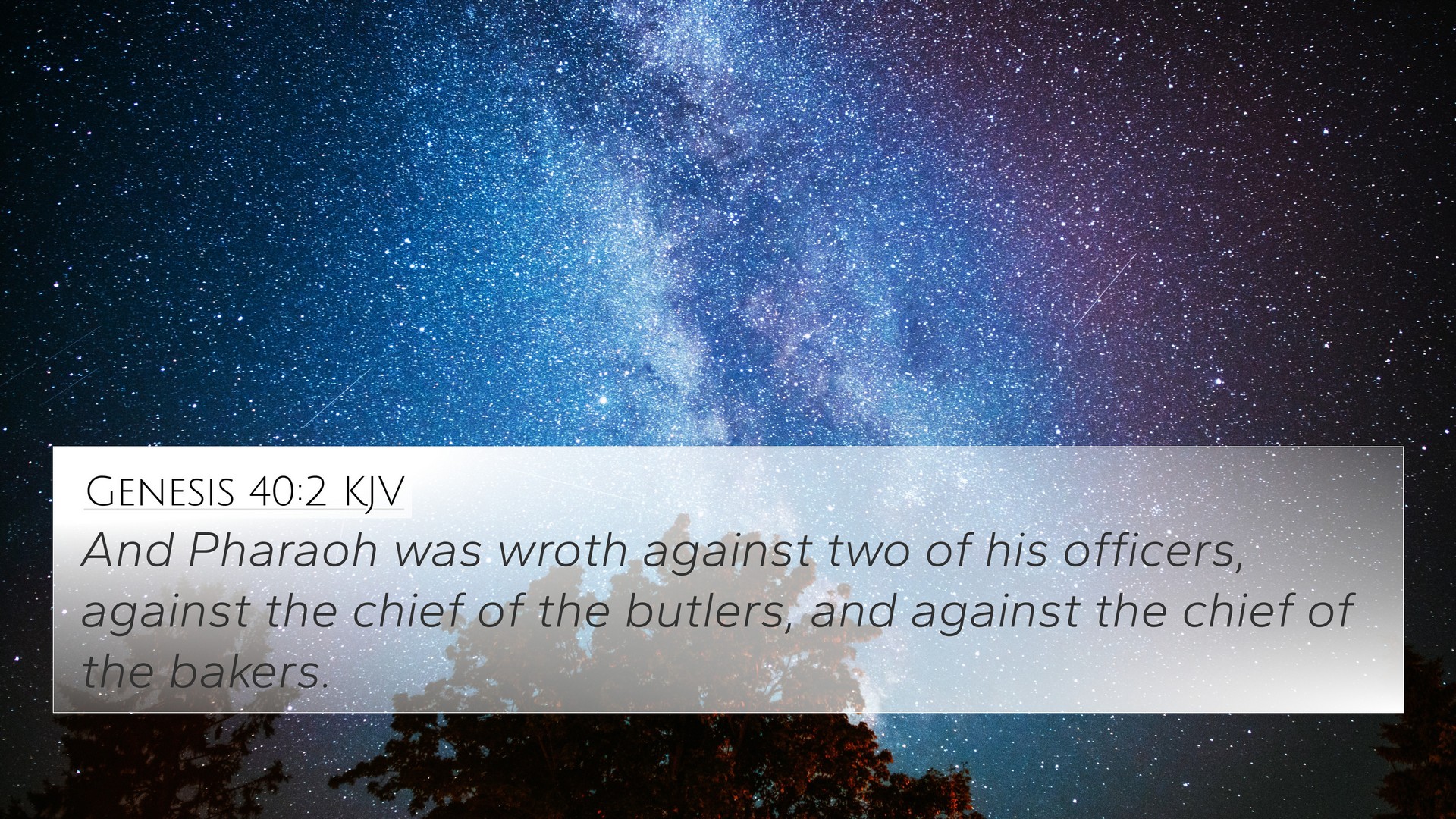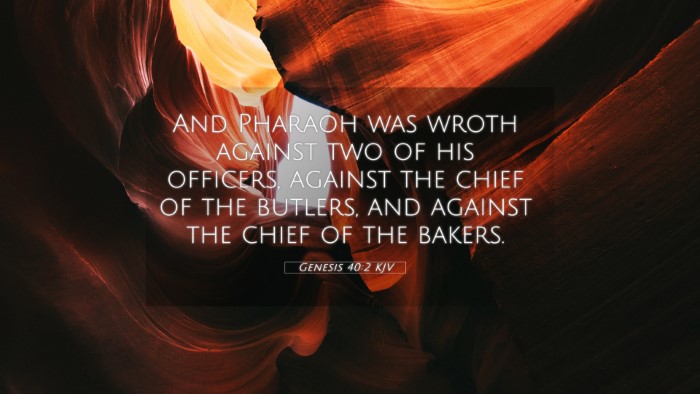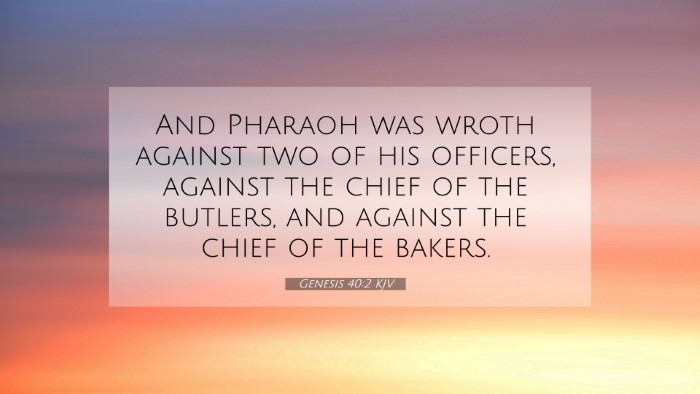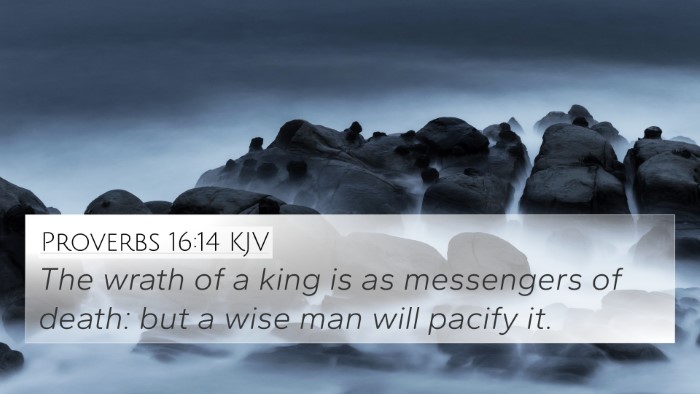Understanding Genesis 40:2
Genesis 40:2 states:
"And Pharaoh was wroth against two of his officers, against the chief of the butlers, and against the chief of the bakers."
This verse introduces a pivotal moment in the narrative of Joseph, highlighting his role within the Egyptian court. Through the lens of public domain commentaries, we can delve into its deeper meanings.
Commentary Overview
This analysis draws insights from renowned commentaries by Matthew Henry, Albert Barnes, and Adam Clarke to provide a comprehensive understanding of this verse.
Context of Genesis 40:2
The broader narrative involves Joseph, who, despite his imprisonment, remains a significant figure due to his interpretive gifts. The anger of Pharaoh towards his officers sets the stage for subsequent events that will lead to Joseph's rise in power.
Insights from Commentaries
-
Matthew Henry:
Henry emphasizes the sovereignty of God in placing Joseph in situations that lead to his eventual promotion. This verse underscores the idea that even in moments of anger and judgment, God's plans are at work.
-
Albert Barnes:
Barnes provides historical context regarding the butlers and bakers, explaining their roles in the royal household and the significance of their positions. He notes that their offenses, particularly in relation to Pharaoh's food and drink, would be seen as major transgressions.
-
Adam Clarke:
Clarke offers a detailed analysis of the term "wroth," highlighting Pharaoh's authority and the immediate consequences of challenging such power. He suggests that this moment serves to illustrate the precarious nature of favor in the royal court.
Connecting Themes in Scripture
Genesis 40:2 can be cross-referenced with several other Bible verses that illustrate similar themes of power, judgment, and divine providence. Below are some notable connections:
- Genesis 39:21 - Joseph in prison, highlighting God’s favor.
- Proverbs 21:1 - The king’s heart is in the hand of the Lord, emphasizing divine control over leaders.
- Acts 7:9-10 - Reference to Joseph’s life and how God was with him.
- Romans 8:28 - All things work together for good, reflecting God’s ultimate plan.
- 2 Corinthians 1:20 - All of God’s promises find their yes in Christ, reinforcing the trust in divine promises.
- Job 42:2 - Acknowledging God’s omnipotence, connecting to the overarching theme of divine governance.
- Psalms 105:19 - The fulfillment of God’s purpose through Joseph's trials.
Thematic Analysis
The themes relevant to Genesis 40:2 can be categorized as follows:
- Divine Providence: The overarching narrative of Joseph’s experiences illustrates the hand of God orchestrating events for his purposes.
- Authority and Judgment: Pharaoh's anger indicates the seriousness of compliance within the royal court and reflects broader themes of authority seen throughout scripture.
- Preparation for Leadership: Joseph’s trials are ultimately a preparation for greater responsibilities, mirroring the experiences of many biblical leaders.
Inter-Biblical Dialogue
Through cross-referencing these scripture passages, one can uncover intricate patterns that link the Old Testament events to teachings in the New Testament. For example, understanding Joseph's trials in light of Jesus’ own sufferings enriches a broader theological context.
Tools for Further Study
For those interested in deepening their understanding of biblical texts, several tools are available:
- Bible Concordance: A valuable resource for locating passages and themes quickly.
- Bible Cross-Reference Guide: A structured approach to gaining insights into related scriptures.
- Cross-Reference Bible Study: Methods for thorough examination of scripture connections.
Conclusion
Genesis 40:2 is a profound verse that sets the stage for Joseph’s eventual elevation within Egypt. Through the study of various commentaries and cross-referencing, one can gain deeper insights into its implications for understanding God's sovereignty, human authority, and the unfolding of divine plans across scripture.
By engaging with the connections provided throughout the biblical text, believers are encouraged to reflect upon the significance of their own life's events, recognizing the providential hand of God in both trials and triumphs.









